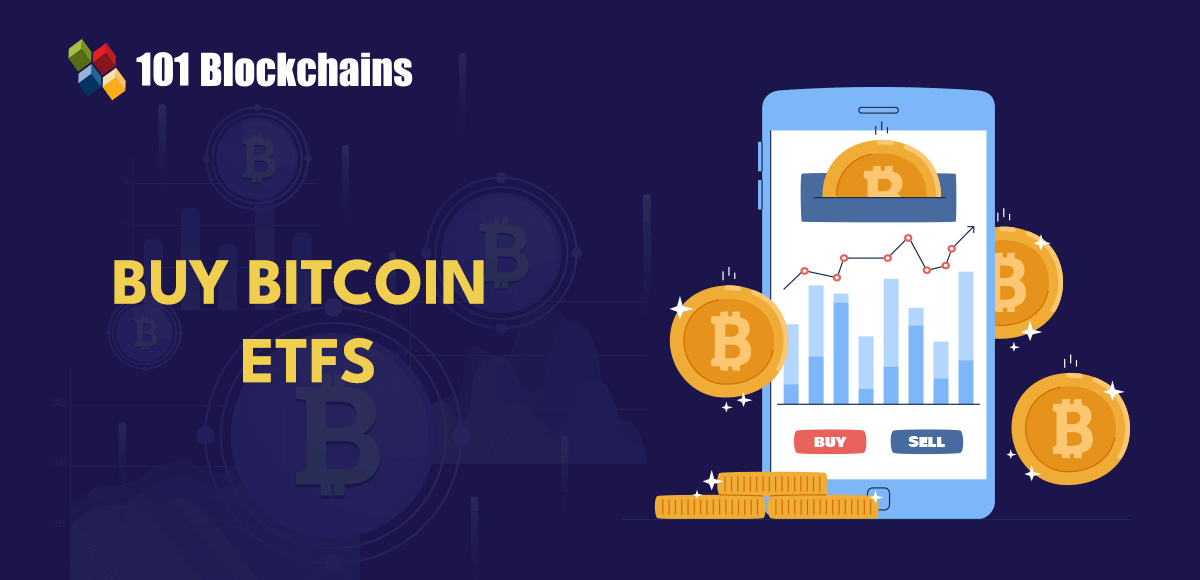How to Buy Bitcoin ETF?

Bitcoin ETFs are a hot trending topic in the cryptocurrency industry for several reasons. First of all, people want to know how to buy Bitcoin ETFs because it provides an easier way to invest in Bitcoin. ETFs, or Exchange Traded Funds, have served as a key component of the traditional financial services environment for portfolio diversification.
Using an ETF for Bitcoin could serve the same purpose for the cryptocurrency and help investors lower the risk of investing in Bitcoin. Interestingly, advocacy for Bitcoin ETFs gained momentum in 2013 with the first proposal for a Bitcoin ETF promoted by the Winklevoss Twins. After years of rejecting proposed Bitcoin ETF trading, the SEC finally approved the ETF on January 10, 2024. Let’s learn more about the BTC ETF and how to buy it.
Enroll in our Bitcoin Technology Course today to learn about Bitcoin mining and transactions and the information contained in blocks.
What is the importance of Bitcoin ETF?
Bitcoin is the first cryptocurrency, which is one of the reasons why it has become a major highlight in the world of technology and pop culture. However, retail investors still face problems gaining exposure to Bitcoin. Interestingly, cryptocurrency ETF trading can serve as a key tool to encourage retail investor participation in the cryptocurrency market. A Bitcoin or cryptocurrency ETF is a financial product that helps investors gain exposure to Bitcoin price fluctuations without holding Bitcoin.
The main value proposition of Bitcoin ETFs is their focus on accessibility as they are also available on traditional stock exchanges such as NASDAQ and the New York Stock Exchange. ETF The growing interest in Bitcoin price is clear evidence that individual investors have entered the cryptocurrency ETF market.
With regulatory approval, retail and institutional investors have discovered opportunities to invest in Bitcoin. ETFs provide a regulated and convenient approach to investing in Bitcoin. The importance of Bitcoin ETFs also shines a spotlight on the benefits of convenience as investors do not have to worry about the security and volatility of Bitcoin prices.
Embrace the technological leaps and global adoption that await in the upcoming 2024-2025 bull market with our Crypto Bull Run Ready Career Path.
How many types of ETFs can you find?
You can find two variants of ETFs or exchange-traded funds: Spot Bitcoin ETF and Futures Bitcoin ETF. The interest of retail investors looking to buy a BTC ETF will be noticeably tilted towards futures Bitcoin ETFs. The Futures ETF does not provide ownership of Bitcoin and uses Bitcoin futures contracts to track price movements.
Futures Bitcoin ETFs can help investors speculate on the future price of Bitcoin. On the other hand, spot Bitcoin ETFs have emerged as another alternative because they hold actual Bitcoin as the underlying asset. Spot Bitcoin ETFs work by tracking the real-time price of Bitcoin.
Learn cryptocurrency terms with cryptocurrency flashcards.
What is the difference between holding Bitcoin and holding a Bitcoin ETF?
The Bitcoin ETF’s value proposition may give a better impression of its usefulness. To avoid risk, you should buy Bitcoin ETFs rather than Bitcoin. In the case of ETFs, investors can purchase products that help them track the prices of related instruments or securities through the same mechanisms used for index funds. Bitcoin ETFs can help simplify investors’ jobs by helping them manage their assets without having to maintain a cryptocurrency wallet or choose a cold wallet.
The benefits of Bitcoin ETF trading focus on how it can help retirement funds, registered investment advisors, and various institutions access Bitcoin. People and institutions that have experienced limitations in access to cryptocurrencies can own Bitcoin using ETFs. With the help of Spot Bitcoin ETFs, you can actually hold Bitcoin in your investment portfolio. On the other hand, Bitcoin futures ETFs are another financial instrument that works on speculation about the future price of Bitcoin.
Another notable difference between Bitcoin ETFs and Bitcoin is the convenience factor. Investors may seek intervention from regulators on cryptocurrency ETF trading, such as the SEC in the United States. On the other hand, direct investments in Bitcoin are subject to a limited regulatory framework.
There is no need to pay special attention to managing Bitcoin ETFs, as brokerage accounts are useful for managing all operations. However, you must manage your direct Bitcoin investments through a cryptocurrency wallet along with responsibility for the security of your assets.
Want answers to frequently asked questions about cryptocurrency? Check out our detailed guide to frequently asked questions about cryptocurrency.
Which Bitcoin ETFs Have SEC Approval?
The U.S. Securities and Exchange Commission (SEC) proposed approval to spot Bitcoin ETFs from major fund managers on January 10, 2024. The Bitcoin Futures ETF has already been approved in October 2021. To track ETF Bitcoin price movements, you need to know: Recently approved spot ETF. Spot Bitcoin ETFs that recently received SEC approval include:
- Grayscale Bitcoin Trust
- Bitwise Bitcoin ETF
- BlackRock iShares Bitcoin Trust
- Invesco Galaxy Bitcoin ETF
- Fidelity Wise Origin Bitcoin Trust
- Franklin Templeton Franklin Bitcoin ETF
- Valkyrie Bitcoin Fund
- ARK 21Shares Bitcoin ETF
- VanEck Bitcoin Trust
- Hashdex Bitcoin ETF DEFI
- WisdomTree Bitcoin Fund
All of these spot Bitcoin ETFs are available on all stock exchanges in the United States. You can find spot Bitcoin ETFs on NASDAQ, Chicago Board Options Exchange, and New York Stock Exchange. Interest in Bitcoin ETF trading has gained momentum due to the approval of futures Bitcoin ETFs, which track price movements to buy or sell Bitcoin at a predefined price. Proshares Bitcoin Strategy ETF, or BITO, is one of the first Bitcoin ETFs to receive SEC approval. You can find ETFs on the New York Stock Exchange.
Build your identity as a certified blockchain professional with 101 Blockchains’ blockchain certification, designed to provide enhanced career prospects.
What are the different ways to buy Bitcoin ETFs?
There is growing interest in Buy BTC ETF It also raises doubts about the ideal channel for purchasing ETFs. The most common ways to purchase Bitcoin ETFs are:
-
cryptocurrency exchange
The SEC’s approval of a spot Bitcoin ETF opens the door to introducing ETFs on cryptocurrency exchanges. Most cryptocurrency exchanges are struggling with the impact of a rapidly evolving regulatory ecosystem. However, they have plans to introduce ETFs. For example, Coinbase, one of the leading cryptocurrency exchanges, serves as custodian for eight approved ETFs. Additionally, Kraken, another popular exchange, plans to launch ETF trading services in 2024.
-
online brokerage account
Currently, the most preferred way to purchase Bitcoin ETFs is through an online brokerage account. Online brokerage accounts help buyers access search tools that help them search for funds of their choice by name or ticker symbol for trading purposes. You can purchase SEC-approved spot ETFs through brokerages such as Interactive Brokers, Charles Schwab, Robinhood, and Fidelity.
Interested buyers can also obtain Bitcoin ETFs directly with the help of ETF issuers. You can purchase ETFs by directly visiting the ETF issuer’s portal or website. However, you will need a brokerage account to purchase ETFs. For example, if a customer wants to buy a Bitcoin ETF, he or she must choose one of the brokers on the Hashdex website.
Do you want an in-depth understanding of cryptocurrency fundamentals, trading and investment strategies? Enroll in our Cryptocurrency Fundamentals, Trading and Investing course today.
A Step-by-Step Guide to Buying a Bitcoin ETF
If you search for ETF Bitcoin price and its advantages, you will get a variety of answers. However, it is important to find out the essential steps that can help you buy the Bitcoin ETF of your choice.
You should start by downloading a brokerage service app like Robinhood or BlackRock. On the other hand, you can also open a web portal. You’ll then need to complete important know-your-customer checks before logging in.
Traders must fund their brokerage accounts with the help of linked bank accounts, such as savings or checking accounts. As a trader, you can fund your brokerage account through wire transfer, check deposit, or transferring funds from another broker.
-
Comprehensive research on available Bitcoin ETFs
Before starting your Bitcoin ETF trading journey, it is important to focus on important aspects such as expense ratio and ETF issuer. Expense ratio refers to the fees charged by the issuer for operating the ETF, which may affect the overall return.
-
Select the ETF you want to buy
Investors should explore the full range of Bitcoin ETFs to select one that suits their investment objectives and preferences. This process involves evaluating various factors such as ETF Bitcoin price and other criteria to identify the right ETF.
-
Order and monitor regularly.
Finally, you can purchase the ETF of your choice using funds from your brokerage account. Buyers can follow different trading strategies and choose unique buy orders such as market, stop or limit orders. Investors can submit a final purchase order after reviewing the order details to ensure accuracy. At the same time, it is important to regularly review your investments to effectively respond to market changes.
Start learning about cryptocurrency today with the world’s first cryptocurrency technology path featuring high-quality resources customized by industry experts!
final words
The SEC’s approval of spot ETFs is an important milestone in the adoption of cryptocurrency ETFs. You can find a variety of approaches to trading cryptocurrency ETFs, from buying on cryptocurrency exchanges to using brokerage accounts. It is also important to note that ETFs for other cryptocurrencies will also enter the market. Learn more about ETFs and the value benefits they offer.

*Disclaimer: This article should not be considered, and is not intended to provide, investment advice. The statements made in this article are not investment advice and should not be taken as such. 101 Blockchain is not responsible for any loss suffered by anyone relying on this document. Do your own research!



